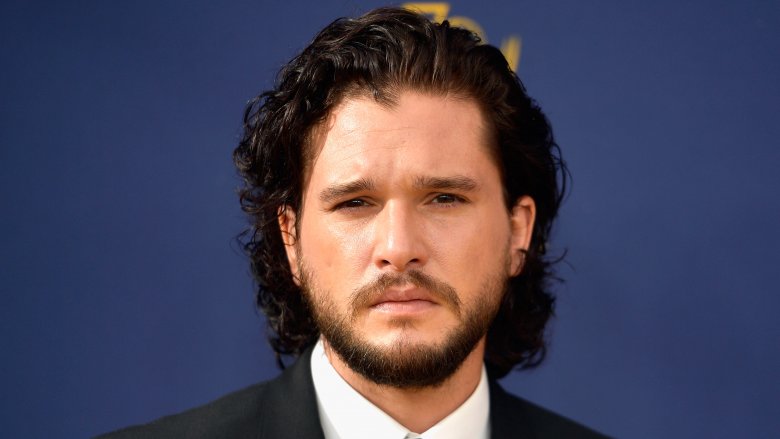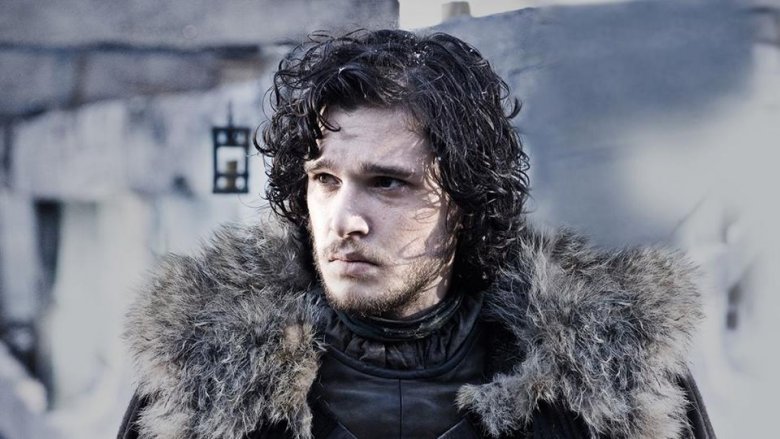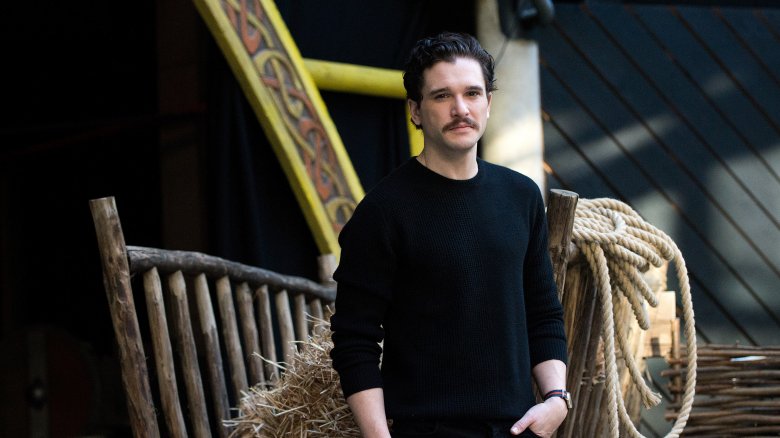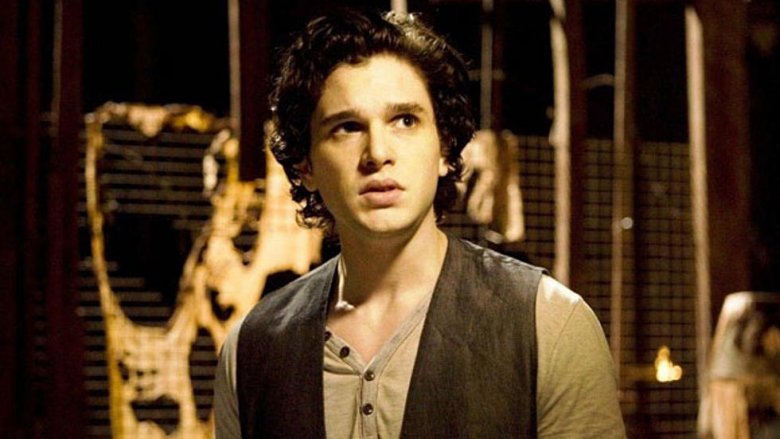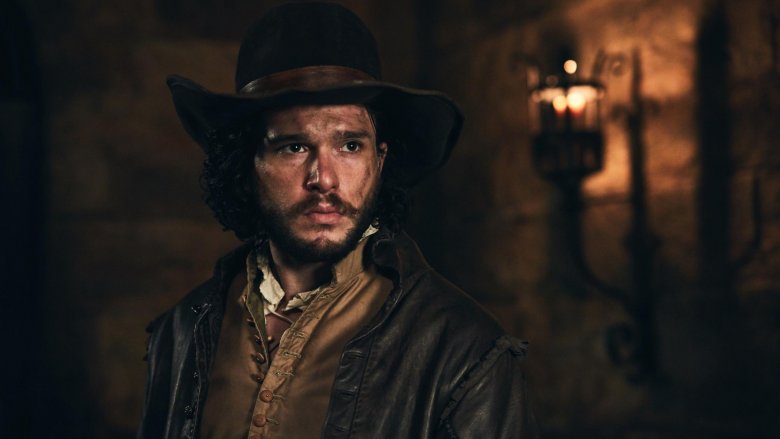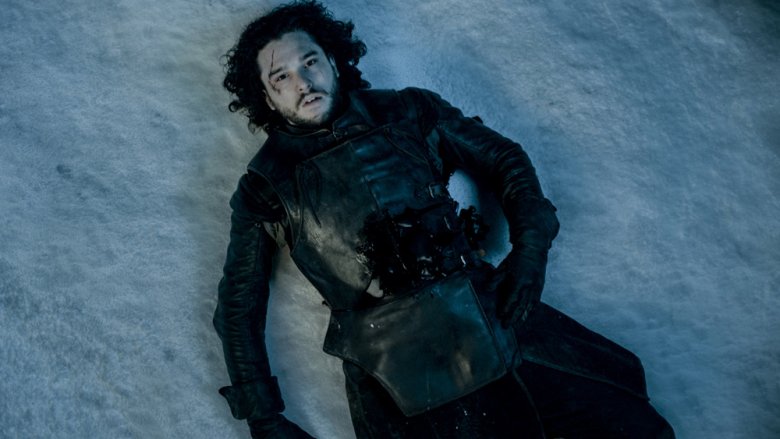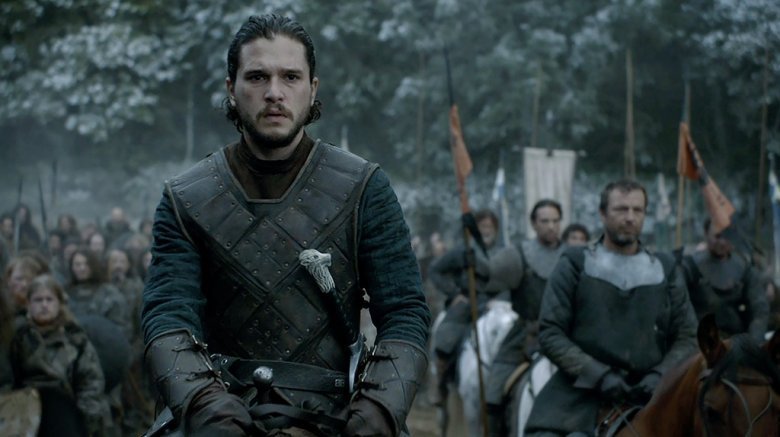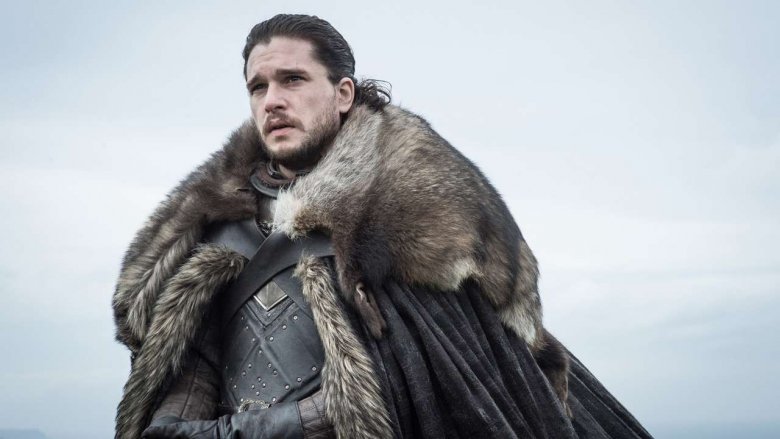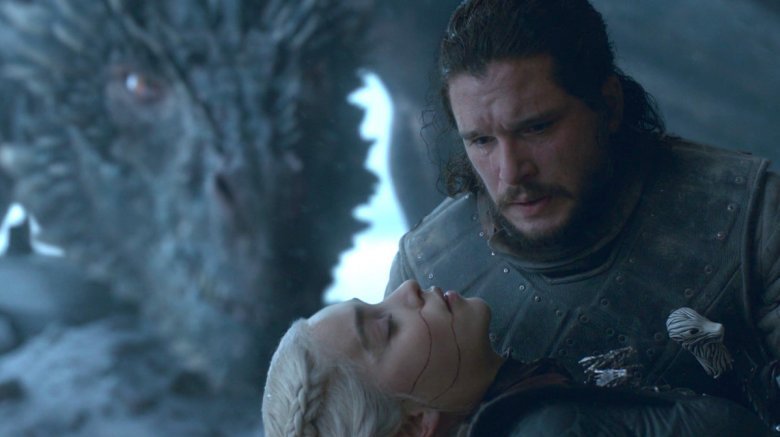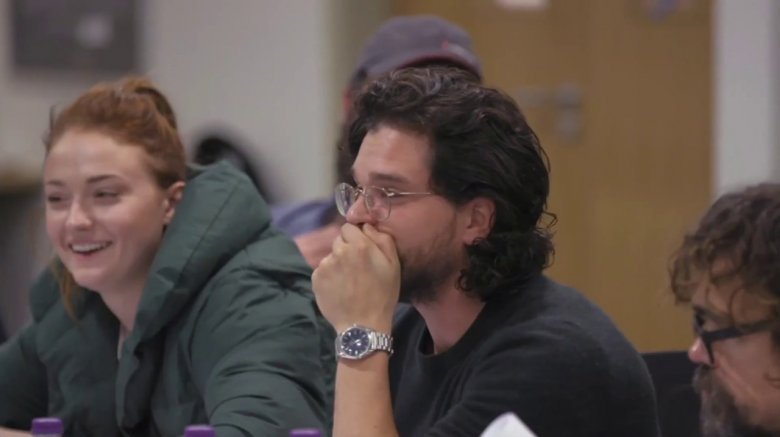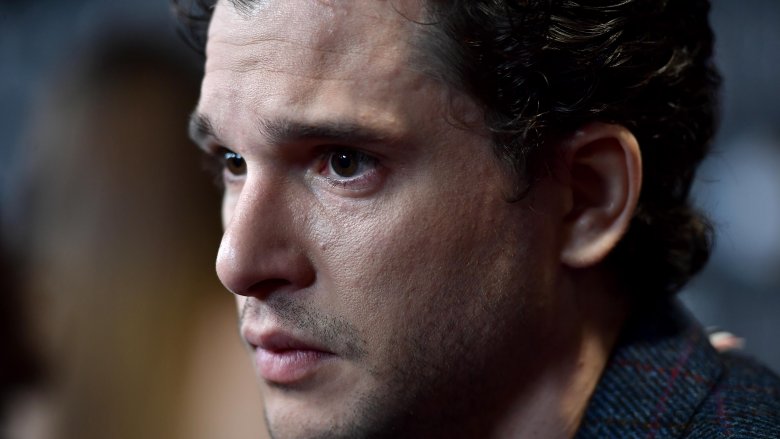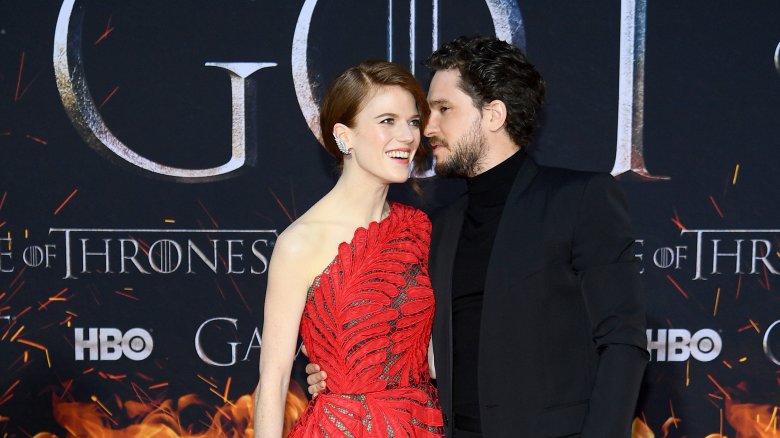Why Kit Harington Hasn't Been The Same Since Game Of Thrones
When a young actor skyrockets to fame seemingly overnight thanks to a super high-profile project, it can certainly be a jarring experience going from relative obscurity to worldwide fame in a matter of months. This was especially true for the young cast of HBO's pop culture juggernaut, Game of Thrones, which featured several young actors who were catapulted to stardom as they grew up during the series' eight-season run. From Maisie Williams, who perfectly inhabited Arya Stark as she grew from a would-be warrior to a fierce assassin, to Emilia Clarke, who portrayed Daenerys Targaryen's evolution from a naive child bride to a vengeful dragon queen, it was likely pretty thrilling to come of age on Thrones, but it was probably also pretty difficult at times.
For proof, just ask Kit Harington. As Jon Snow, the alleged bastard of the Stark family who turns out to be a royal heir to the Iron Throne, Harington was faced with plenty of challenges during his run on the series. And it seems to have taken an understandable toll on the young actor off-screen, as well. Here's how Game of Thrones changed Kit Harington, and why he hasn't been the same since joining the show.
Kit Harington was cast in Game of Thrones at a young age
Much like his Game of Thrones character, Kit Harington comes from storied roots, and he even has some royal blood in his lineage. His family can trace its line back to Charles II of England, and several of his relatives were viscounts and baronets, but even that didn't necessarily prepare a young Harington for a life of superstardom.
At the age of 24, Harington was cast in Game of Thrones as Jon Snow, a young, brooding character and the supposed bastard of Ned Stark (Sean Bean). Though it later turns out that Jon is actually the legitimate child of Ned's sister and a Targaryen prince, he begins the series as a downtrodden outsider, feeling like an outcast among the highborn Stark family. And that downbeat tone left little room for any levity in Harington's scenes.
Before the age of 25, Harington became an international star, with his face and name everywhere as Thrones became one of the biggest shows on television, which was likely a pretty abrupt change for a young actor with formal training (in 2008, he graduated from London's Central School of Speech and Drama). And without much time to adjust to his new celebrity status, it may have been quite difficult for Harington to get used to a completely new and foreign style of living.
Harington's involvement in theater
As a classically trained actor, Kit Harington got his real acting start on the stage, which likely didn't prepare him for a life of massive stardom. After graduating from acting school, Harington's first high-profile role was in War Horse, a play about a young man and his horse trying to survive World War II. The play premiered in London's famous West End, and after it won two Olivier Awards (the British equivalent of a Tony Award), Harington's star was officially on the rise, and he followed it up with a turn in Posh, a dark comedy about young men attending Oxford University.
During his tenure on Game of Thrones, Harington had way less time to spend on the stage, but he did take a little time to return to his roots once filming wrapped. In fall 2018, he appeared in a West End production of Sam Shepard's classic play True West, playing Austin to Johnny Flynn's Lee, two brothers constantly at odds. The play ran until February 2019, giving Harington a return to form that was likely sorely needed.
A few of Harington's films flopped at the box office
When a young star makes it big in television, it's only natural that they may want to try and transition to movies, and Harington was no exception during his time on Game of Thrones. However, his outings weren't exactly winners, which was probably a tough blow for the burgeoning star.
Harington made his film debut in 2012's Silent Hill: Revelation 3D (pictured above), adapted from the popular video game series and a sequel to 2006's Silent Hill movie. But unfortunately, it wasn't as big of a hit as he hoped it would be. It currently holds a measly ten percent rating on Rotten Tomatoes, and with an intake of just over $52 million on a $20 million budget, its box office performance was downright dismal.
Harington gave blockbusters another shot in 2014 with Pompeii, shot partly on the real location of the ancient disaster, but he struck out yet again. With a budget of around $100 million, the film only made $117 million at the box office, and its reviews weren't much better. Harington may have mastered a blockbuster television series, but his first few movie forays didn't work out quite as well.
He took a short comedy break
Luckily, Kit Harington's next high profile, non-Thrones project wasn't released in theaters, forgoing any box office issues entirely, as well as striking a stark (pun intended) and much needed contrast to his previous work.
In 2015, Harington starred alongside Andy Samberg (Saturday Night Live, Brooklyn Nine-Nine) in HBO's sports mockumentary 7 Days in Hell, which tells the story of a fictional, week-long tennis match between two imaginary and exaggerated tennis talents. As Charles Poole, the hopelessly stupid and slow-witted British champion whose sole mission is to win the Wimbledon title for England, Harington displayed some impressive comedic chops, especially considering that he had to play against Samberg, who, as Aaron Williams, played his usual bombastic character who's known in the film as the "bad boy" of the tennis world.
7 Days in Hell received largely positive reviews, thanks to its sharp satire, hilarious performances, and perfect length (at just 45 minutes, it doesn't overstay its welcome). Getting a comedic success under his belt was definitely a smart move for Harington, but before too long, he was back in Jon Snow's dour black robes. However, a few years later, he showed off his funny side once again with a well-executed hosting stint on Saturday Night Live to celebrate the final season of Thrones.
His original series went largely unnoticed
Thanks to the success and fame he gained from Game of Thrones, Kit Harington now had more creative freedom, which he exercised by producing an original show that, like Thrones, aired on HBO (and BBC in the United Kingdom, for which it was originally produced). Titled Gunpowder, this period piece tells the story of England's famous Gunpowder Plot, which was a failed assassination attempt against King James the I in 1605. The coup was led by Robert Catesby, who wanted to restore Catholicism to the throne (James I was a stout Protestant).
Harington had a particularly personal connection to this specific subject matter. Catesby, who led the doomed plot, was actually a direct ancestor to Harington, and in the series, Harington got the chance to play Catesby himself. Though the three part miniseries garnered decent reviews, it flew largely under the radar compared to Thrones, which was probably a disappointment for Harington, considering that Gunpowder was developed and produced by the young actor.
Kit Harington needed therapy during Game of Thrones
At the end of Game of Thrones' fifth season, viewers were stunned when Jon Snow was stabbed by his own men and left to bleed to death in the snowy courtyard of Castle Black. As the episode faded to black, Jon lay dying, and though he was revived by the Red Priestess Melisandre (Carice van Houten) two episodes into the sixth season, fans had every reason to believe that he was definitely dead. After the Red Wedding, loyal Game of Thrones followers knew that the show would kill its darlings whenever possible.
It didn't help that Harington and the show's crew spent over a year lying about Jon Snow's fate. Harington himself confirmed that Jon was dead, and that he wouldn't be returning for the following season. The director of the episode, David Nutter, was even forced to lie to President Barack Obama when he wanted more information about Jon Snow's fate. (Apparently, presidential security clearances don't extend to Game of Thrones secrets). This lying — coupled with all the attention — took an understandable toll on Harington, and he admitted that in the aftermath of it all, he needed therapy, telling Variety, "That was a time when I started therapy and started talking to people. I had felt very unsafe, and I wasn't talking to anyone."
Some Game of Thrones scenes were harrowing for Harington
Game of Thrones featured plenty of difficult scenes throughout its run, from Ned Stark's brutal execution to the bloody Red Wedding, and some of the scariest moments were the battle scenes, which frequently ended in bloodshed and only occasionally yielded good results for our heroes. One example is the Battle of the Bastards, where Jon faces off against fellow "bastard" Ramsay Bolton (Iwan Rheon), who's just brutalized Jon's sister and killed his youngest brother. Though he eventually emerges victorious, there are several moments where it seems like Jon will definitely lose this battle, especially one where he's buried by a pile of converging men and horses. Despite being deeply frightened, Harington pulled through and filmed the scene, but it certainly wasn't easy.
The final season brought even more challenges. Filming the brutal Battle of Winterfell required 55 consecutive night shoots in freezing Belfast, which prompted most of the cast to speak up about how tough it was. However, Harington had yet one more challenge to overcome. He also was brutally honest about how hard it was to ride a CGI dragon, since the actors had to actually sit on a contraption that looked like a mechanical bull for hours on end. And as Harington explained, it was incredibly difficult to ride, particularly for men. He even went so far as to call the experience "horrific."
He struggled with the ending of Thrones
Kit Harington's stardom was entirely tied to Thrones, so it definitely makes sense that he struggled with the show ending, experiencing a perfectly understandable emotional roller coaster as the show came to a close. When it came to the ending of Thrones, Harington took it fairly hard.
In conversation with GQ Australia, Harington admitted that filming the final season was brutal for a number of reasons. Beyond grueling schedules and freezing night shoots, Harington said, "The last season of Thrones seemed to be designed to break us. Everyone was broken at the end." However, he qualified that by saying, "I don't know if we were crying because we were sad it was ending, or if we were crying because it was so f*****g tiring."
He also told Variety that every member of the cast was extra emotional during the final season, and while on set, he watched fellow actor Peter Dinklage (who'd won multiple Emmys during the series for playing Tyrion Lannister) break down after his final shot. Just like Dinklage, Harington also wept after his final shot, admitting to feeling "a huge heave of emotion" and "just blubbing." It makes sense that Harington would feel an enormous emotional toll as Thrones ended, and it must've been quite rough for him in the long run.
He defended the controversial finale
Everyone who works on a show for the long run hopes that its fans will enjoy its conclusion, but unfortunately, that definitely wasn't the case for Game of Thrones. Its final season, which contained only six episodes, was controversial, to say the very least. Thanks to rushed pacing, uneven character development, and some ill-advised writing and directing decisions, the eighth season attracted plenty of derision and ended up earning some pretty dismal reviews by the time it concluded its run in May 2019, even spurring a petition by disgruntled fans who wanted the entire final season to be rewritten with "competent writers." (Unsurprisingly, HBO shut that down pretty quickly.)
In the aftermath of Thrones' extraordinarily divisive season finale, which saw Jon Snow kill his aunt and girlfriend Daenerys Targaryen and return to the Night's Watch as punishment, Harington defended the unpopular episode to multiple outlets, telling Esquire, "I think no matter what anyone thinks about this season — and I don't mean to sound mean about critics here — but whatever critic spends half an hour writing about this season and makes their [negative] judgement on it, in my head they can go f*** themselves. 'Cause I know how much work was put into this." The actor also defended Jon's decision and Daenerys' descent into madness. Harington may have been exhausted by the show's final season, but at least he stood by it until the bitter end.
The Last Watch gave fans an insight into Harington's emotional state
One week after Game of Thrones' final season aired, HBO gave fans one last look at Westeros with The Last Watch, a documentary that chronicled the cast and crew's final journey. From featuring the series' "snow expert" to looking at the intense makeup required for the wights and White Walkers, The Last Watch was the perfect final beat for the series, which was just as much of a saga behind the scenes as it was on the screen.
And yeah, during this documentary, Harington gets super emotional.
Harington's first few emotional moments come during the final table read, which is unsurprising considering that he purposefully didn't read any of the last few Thrones scripts. First, he looks both shocked and thrilled when he discovered that Arya, not him, would be the one to slay the seemingly undefeatable Night King (Vladimir Furdik). His bigger table read reaction comes later, however, as they read the final episode, when he visibly tears up after realizing he will have to kill Daenerys at the end of the series. Finally, in Harington's last scene on the show, the actor wells up as he calls a series wrap on the character he inhabited for eight seasons.
In other words, leaving Game of Thrones was just as sad for Harington as it was for everyone watching.
He took an important post-Thrones step
Harington was rarely shy about his feelings throughout his run on Thrones, from his admission that he sought therapy to his open emotional state during The Last Watch, but apparently, the entire experience took an unexpected toll on the actor, forcing him to take a drastic but important step once the series came to an end.
Shortly after Thrones took a final yet clumsy bow, Harington and his team announced that he was taking a big break from the public eye by checking into a wellness retreat, with a representative telling his fans, "Kit has decided to utilize this break in his schedule as an opportunity to spend some time at a wellness retreat to work on some personal issues." Harington was spotted out and about once he was ready to get back out there, but in the end, it's admirable that he took a public step to remedy his mental health, especially after the undeniable physical and emotional toll that came with Thrones' final season.
The big upsides for Kit Harington
Kit Harington's time on Game of Thrones certainly wasn't all negative. Most notably, during his time on the hit series, he met his wife, Rose Leslie, who played his on-screen love interest, Ygritte. The two kept their relationship mostly quiet, even after Leslie's character was killed off the series (her final scene saw her dying in Jon's arms), but their highly publicized wedding in 2018 was attended by most of Harington's Game of Thrones castmates.
After all of the ups and downs on the hit series, Harington's final turn on Thrones didn't fade quietly even after the show ended. In July 2019, he earned an Emmy nomination for Outstanding Lead Actor in a Drama, marking his second ever nomination and his final nod for Thrones. In a statement to Us Weekly, Harington said, "Many thanks to the Academy. It's been an amazing journey with ol' Jon Snow. I'm thrilled he's been nominated." Though he took pains to keep himself removed from his signature character, it must've been a great final validation for Harington to receive this honor, particularly as he moves on to new projects after playing Jon Snow for so long.
